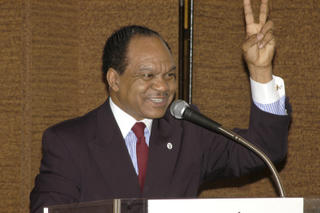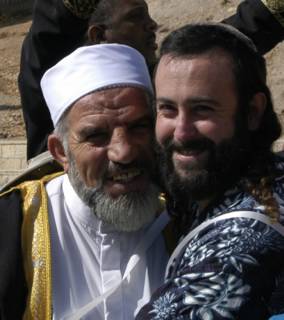Frank Kaufmann
October 2, 2004

This panel is designed to have writers and speakers do something new for the sake of peace. We are called to analyze peace efforts so as to bridge visions, proposals and activities coming from religion and civil society with the world of political power.
Peace activists and spiritual leaders often blame politicians for war and conflict, explicitly or implicitly painting political figures in broad generalizations as enemies of enlightenment, peace, and reconciliation. Conversely political leaders and elected officials often see religious and civil peace activists as hopelessly naïve, and clueless about even minimal realities with which responsible political leaders must deal every day.
This lack of understanding and lack of sympathy for the positions and realities of these two groups prevents progress for a better world which both camps long to see, and both camps imagine themselves to be pursuing fervently and responsibly.
It is the purpose of this panel and this paper to ponder the unique constraints facing political leaders and for leaders in various sectors including the political to begin to envision how each respective sector can be more helpful and supportive for conscientious political leaders to take the politically risky steps required to advance the cause of peace. In short, “it is time to stop pointing fingers and blaming others. It is time to begin the work in my own profession and vocation to help empower every fellow traveler.”
What Makes Peace?
Religious acts make peace. Note I did not say religion contains the key to peace. I might. So what. I did not say religion teaches us clearly what is necessary for peace. It might. So what.
Religion has two jobs: 1. accurately identify the source of human problems and clearly prescribe the antidote, and 2. Accurately define the original ideal way for human life in the absence of problems (in other words, what sort of behavior allows the repaired state to persist).
The religious PERSON on the other hand has two slightly different jobs: 1. DO what solves the problem, and DO what maintains an ideal harmonious state.
Every conflict situation results from 2 bases: 1. the history of my wrongdoing, and 2. the history of the wrongdoing of the other. Which of the two do you think you have a greater chance of fixing? To which of the two problems do you have greater access to get your hands on and fix? It is obvious. I have greater access to my own problems. The history of my own wrongdoing and my own present wrongdoing is the only reasonable point of focus for anyone claiming to be serious about the pursuit of peace. I refer to my own personal wrong doing, the wrong doing of my own family, or my own people, of my own race, of my own co religionists. These comprise half of every conflict situation.
Firstly, if I really want peace, what must I do vis a vis my present wrong doing? Answer. Stop it. Stop doing wrong. This is a religious act. To stop doing wrong is a religious act.
Next, what do I do about the history of my wrongdoing, the wrong that members of my family or my clan, or the wrong my people have committed. Answer. Say sorry. Not I’m sorry BUT. Just sorry. To say sorry is a religious act. It is called repentance.
Thirdly, if someone has done wrong to you, wrong to the members of your family, wrong to your people and they come to you and say they are sorry. What should you do? You should forgive that person, or those people. This is a religious act. To forgive is divine.
Conflict canNOT exist in the presence of someone who has genuinely repented of their crimes to the aggrieved party, and the aggrieved genuinely forgave the offending party. If anyone has gone through this you know that the bond of love and tears from these paired acts are among the most powerful in all of the human experience.
Fourthly the repentant wrongdoer and the aggrieved (usually both parties are both), MUST collaborate to establish a just and equitable reality in which no further wrongdoing in system, structure and circumstance obtain, and both sides must invest unconditionally and without reservation in maintaining that universe. This is a religious act, it is called giving.
It should be clear that the problem of peace is NOT complicated. Nothing could be simpler that achieving and maintaining peace. I didn’t say it was easy. I said the problem is simple. Further it should be clear that the path to peace is accomplished by religious acts. Not be religions. Not by religious belief. Not by religious teachings. It is accomplished by 3 religious acts: repentance, forgiveness, and a life of giving unconditionally.
Political Reality
The political coin of the realm is power. It is comprised of 3 things, power over people (or the power OF people), power over wealth (material resources – which includes the power to make gigantic tools of aggression), and power over information; people, money, and knowledge.
There are two approaches to power; control by force and manipulation (power begets power), or influence stemming from attraction for the good that results from the power you accrue.
BUT, whether your relationship with power is of the good or bad sort, does not in any way alter the fundamental reality of politics, and that is that is about power. Power seeks ever greater authority. This is not a negative. In and of itself it is neutral. It is simply the nature of power.
Once you are involved in politics you are in the power game. You are involved in a dynamic in which you participate in the pursuit of ever greater authority (namely ever more complete and ever more expansive authority). There are others involved in the same sweep and dynamics, and you have to deal with this in some manner or another. Even if your relationship with power is of the positive sort, you may well have someone who seeks to challenge your authority using power in a bad or evil way. This is simply your reality. That is the reality of the politician.
[It should be noted that those politicians who engage power in the way of good face no limits to the range and extent of their authority, because they participate in God’s authority and ways. Those who seek the expand power by control and manipulation face a sure half life, and perfect and permanent frustration as resistance will spring forth abundantly and in every place.]
Details of Political Reality
1. You have enemies
2. You represent more than yourself, including representing the wealth and welfare of a community
3. You have electoral vulnerability for your actions
4. You have legal, and material and resource responsibility and culpability for your public actions
5. You have (often powerful) interest groups and contributors associated with your power and authority
6. You have “handlers” and advisors, cabinets, and abundant interests and constraints on your actions which are at all times representative
7. You have the extremely precarious balancing act between “domestic” and “foreign” policy
The Task to Relate Peace and Power
The task before us is quite simple then, how to relate peace dynamics of peace to the realities of those with enough power to do something about matters. I argued earlier that the path to peace involves religious action: 1. Concentrate first on what I myself do and have done wrong. 2. Apologize (repent) to those whom I’ve harmed from my wrongdoing, 3. Forgive those who apologize for their wrongdoing and history of wrongdoing, and 4. Collaborate in a program of giving without reservation to preserve the harmony achieved through the above mentioned acts of reconciliation.
It should be immediately evident that even the best meaning political leader in the world is instantly hamstrung if asked to say I am equally wrong, or to apologize for wrongdoing and so forth. There are massive electoral, legal, fiscal, domestic implications and more for each act an elected representative takes. There are enemies waiting to pounce on any sign of weakness, there are advocacy groups and trial lawyers circling like sharks to demand victim compensation, and the list goes on.
So here you have a group of people in whose hands the whole possibility for peace rests, and they are in the stock and trade which makes it most difficult to effect the basic and most necessary actions which lead to peace.
Preliminary Recommendations to Address This Urgent Challenge
For private sector, civil society, and religious peace activists:
1. Think politically before meeting politicians. Don’t go to meetings only with ideas for peace, but rather with ideas as to how the politician him or herself can safely support your ideas, plans, and recommendations.
a. Do not go just to “inform” or “inspire.” And DEFINITELY do not go to preach. There is no reason to think that you are a better person than the politician whom you go to meet, and there is not reason to presume that your desire for peace or what you are willing to sacrifice for peace is greater than the politician whom you go to meet.
b. Include in your thoughts and proposals what you have to offer politicians (in terms of what THEY THEMSELVES NEED as politicians).
i. Perhaps from the position of your greater freedom, you can provide valuable information. Perhaps you can extend influence to areas or groups that are not accessible to politicians. There are many politically valuable things politicians can use and benefit from, from sincere and genuine peace activitists.
c. a. Surely there is little more politically valuable than the significant human resources represented by major religious groups that are in concert and ready to act in accord.
i. This potential degree of political power can also be used to “express the will of the electorate.” One does not go to elected officials with a begging bowl, but bearing enormous value, “well if you are not interested in supporting tried and effective peace actions, perhaps there is another candidate who could make better use of what we have to offer.
2. Learn political realities and constraints
a. Not every meeting can be public
b. Do not be impatient and judgmental when politicians need to move slowly or discretely
c. Start to think of your own resources in terms of their political value so that you can exert greater influence on the political process, and create a better political environment for enlightened political leaders to act for peace
d. Be willing to get out and work. Find out how to act on the ground politically to build a pro peace political environment in which enlightened political leaders, and elected officials can act more freely and more courageously without being politically and legally vulnerable.
For Political Leaders, Heads of State and Elected Officials
1. See in peace groups valuable political resources, namely people, resources, and knowledge.
2. Support peace activities from the position of your influence and power. Calculate political future and opportunity in terms of alliances and collaboration with true non-agenda driven peace ambassadors.
3. Use the instruments of political power to give advantages to peace ambassadors
4. Place peace ambassadors in positions of influence, in knowledge spheres, and implementation spheres. In short think politically for peace above all, moving constantly in the direction in which the acts which bring peace will be possible for you even as an elected representative, not as an isolated idealist.
